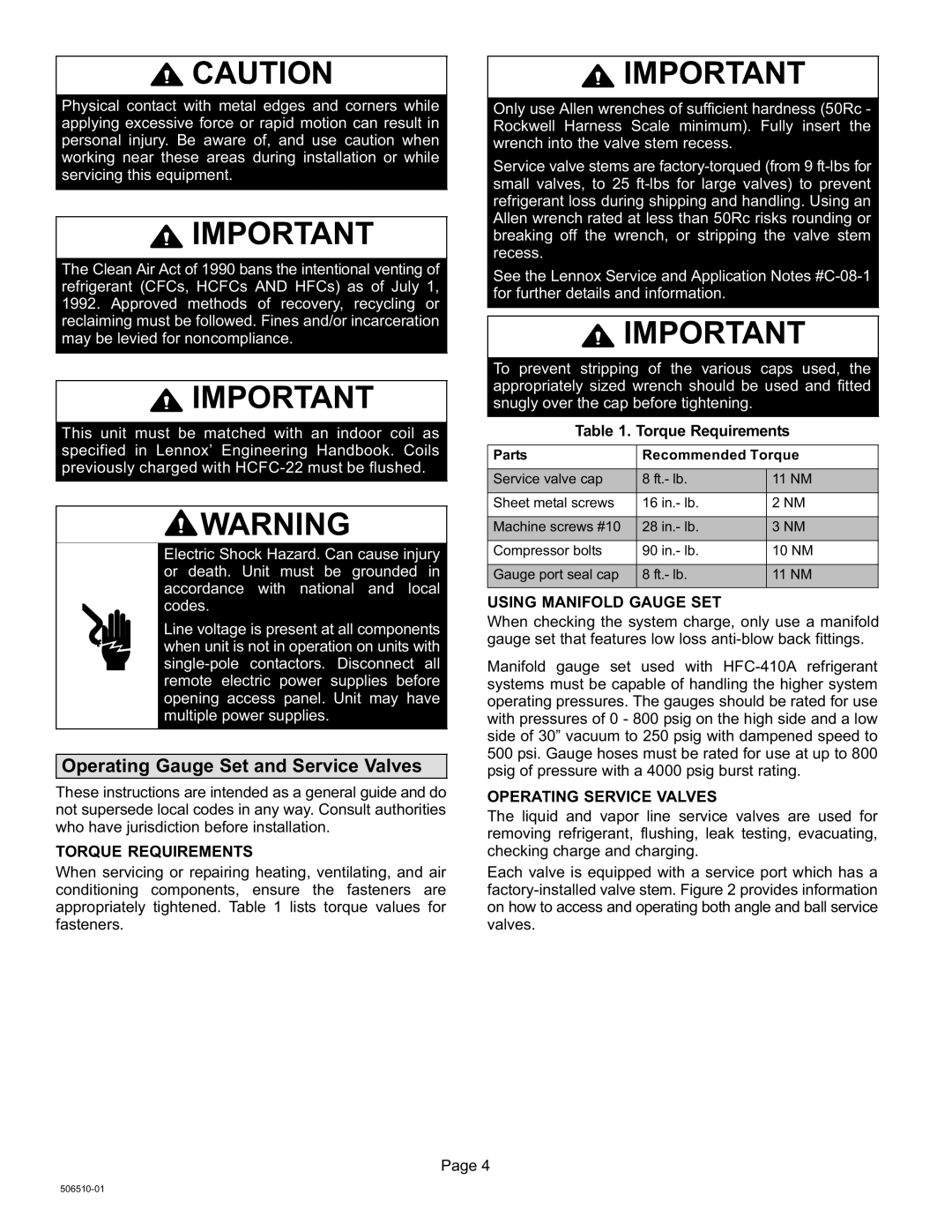
![]() CAUTION
CAUTION
Physical contact with metal edges and corners while applying excessive force or rapid motion can result in personal injury. Be aware of, and use caution when working near these areas during installation or while servicing this equipment.
![]() IMPORTANT
IMPORTANT
The Clean Air Act of 1990 bans the intentional venting of refrigerant (CFCs, HCFCs AND HFCs) as of July 1, 1992. Approved methods of recovery, recycling or reclaiming must be followed. Fines and/or incarceration may be levied for noncompliance.
![]() IMPORTANT
IMPORTANT
This unit must be matched with an indoor coil as specified in Lennox’ Engineering Handbook. Coils previously charged with HCFC−22 must be flushed.
![]() WARNING
WARNING
Electric Shock Hazard. Can cause injury or death. Unit must be grounded in accordance with national and local codes.
Line voltage is present at all components when unit is not in operation on units with
Operating Gauge Set and Service Valves
These instructions are intended as a general guide and do not supersede local codes in any way. Consult authorities who have jurisdiction before installation.
TORQUE REQUIREMENTS
When servicing or repairing heating, ventilating, and air conditioning components, ensure the fasteners are appropriately tightened. Table 1 lists torque values for fasteners.
![]() IMPORTANT
IMPORTANT
Only use Allen wrenches of sufficient hardness (50Rc − Rockwell Harness Scale minimum). Fully insert the wrench into the valve stem recess.
Service valve stems are factory−torqued (from 9 ft−lbs for small valves, to 25 ft−lbs for large valves) to prevent refrigerant loss during shipping and handling. Using an Allen wrench rated at less than 50Rc risks rounding or breaking off the wrench, or stripping the valve stem recess.
See the Lennox Service and Application Notes #C−08−1 for further details and information.
![]() IMPORTANT
IMPORTANT
To prevent stripping of the various caps used, the appropriately sized wrench should be used and fitted snugly over the cap before tightening.
Table 1. Torque Requirements
Parts | Recommended Torque | |
|
|
|
Service valve cap | 8 ft.− lb. | 11 NM |
|
|
|
Sheet metal screws | 16 in.− lb. | 2 NM |
|
|
|
Machine screws #10 | 28 in.− lb. | 3 NM |
|
|
|
Compressor bolts | 90 in.− lb. | 10 NM |
|
|
|
Gauge port seal cap | 8 ft.− lb. | 11 NM |
|
|
|
USING MANIFOLD GAUGE SET
When checking the system charge, only use a manifold gauge set that features low loss anti−blow back fittings.
Manifold gauge set used with HFC−410A refrigerant systems must be capable of handling the higher system operating pressures. The gauges should be rated for use with pressures of 0 − 800 psig on the high side and a low side of 30" vacuum to 250 psig with dampened speed to 500 psi. Gauge hoses must be rated for use at up to 800 psig of pressure with a 4000 psig burst rating.
OPERATING SERVICE VALVES
The liquid and vapor line service valves are used for removing refrigerant, flushing, leak testing, evacuating, checking charge and charging.
Each valve is equipped with a service port which has a factory−installed valve stem. Figure 2 provides information on how to access and operating both angle and ball service valves.
Page 4
506510−01
